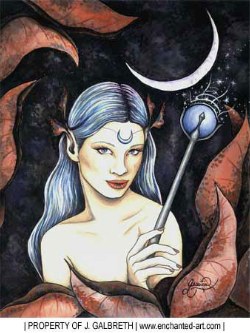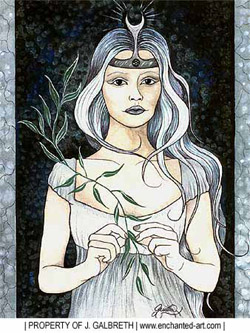



| Note from the web mistress: Because of the similarity of the provinces, powers and stories of many Greek and Roman Goddesses, I have combined the two here. If a Goddess is only present in one pantheon or the other, such will be stated next to her name. In cases where only the names differ, Greek names will be listed first, followed by Roman names. |
| Selene - 'Greek Goddess of the Moon' by Jessica Galbreth.  View more of her beautiful artwork on her site www.enchanted-art.com/ |
| She is the rescuer from every danger and peril, the advisor for every tight spot, and the highest wisdom. The people's chiefs and leaders, as well as the whole people itself, are advised by her; she presides over all local, tribal, and national gatherings. She maintains life and health. She is the gracious, gentle nurse who takes the children of mankind to herself, who makes mothers fertile and children grow and develop, who increases the stock of the people through a strong younger generation. She preserves the divine order in nature, protects the seedlings and fruits from damage, sows and tends the noble and nourishing olive trees. She teaches men how to manufacture and plow, how to yoke oxen, and how to loosen up the hard ground with a rake. From her mankind receives the materials for all the arts that beautify life, and from her their skillfulness. Karl Ker�nyi, Athene: Virgin and Mother in Greek Religion |
| Hecate - Greek Goddess of the Night by Jessica Galbreth.  View more of her beautiful artwork on her site www.enchanted-art.com/ |
Venus - Roman Goddess of Love Artist Unknown |
